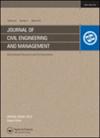泡沫玻璃在底碴层中应用的可能性评估
IF 3.7
3区 工程技术
Q1 ENGINEERING, CIVIL
引用次数: 1
摘要
本文研究了泡沫玻璃是否可以在铁路轨道施工中减少保护层的结构厚度(节省天然材料——碎骨料),同时也为易冻路基表面提供足够的热保护。它还讨论了泡沫玻璃的加入是否会对在底碴上表面水平处增加铁路轨道结构的变形阻力产生相关影响。根据这些假设,本文给出了底碴层(含嵌入泡沫玻璃层)改良结构成分的变形阻力实验测量结果,并将其与底碴层标准成分(碎骨料底碴层/保护层)结构上确定的结果进行了比较。此外,本文还从气候因素的影响角度,对内置隔热泡沫玻璃层对保护性碎骨料层结构厚度减小的影响进行了数值和数学分析。该研究开发的数学模型提供了根据气候特征连续监测铁路轨道结构冻结变化的可能性。本文章由计算机程序翻译,如有差异,请以英文原文为准。
ASSESMENT OF THE POSSIBILITY OF FOAM GLASS APPLICATION IN THE SUB-BALLAST LAYERS
The paper investigates whether foam glass could reduce the structural thickness of the protection layer in the construction of the railway track (saving of natural materials – crushed aggregate) and, at the same time, also provide sufficient thermal protection of the frost-susceptible subgrade surface. It also discusses whether the incorporation of foam glass would have a relevant effect on the increase of the deformation resistance of the railway track structure at the level of the sub-ballast upper surface. Following these assumptions, the paper presents the results of experimental measurements of the deformation resistance of the modified structural composition of the sub-ballast layers (with an embedded foam glass layer) and their comparison with the results determined on a structure with a standard composition of the sub-ballast layers (crushed aggregate sub-ballast layer/protective layer). Also, numerical and mathematical analysis of the influence of the built-in thermal insulation foam glass layer on the reduction of the structural thickness of the protective crushed aggregate layer in terms of the effect of climatic factors is conducted in the paper. The mathematical model, developed by the research, provides the possibility of continuous monitoring of the change in the railway track structure freezing depending on climatic characteristics.
求助全文
通过发布文献求助,成功后即可免费获取论文全文。
去求助
来源期刊

Journal of Civil Engineering and Management
ENGINEERING, CIVIL-
CiteScore
6.70
自引率
4.70%
发文量
0
审稿时长
1.7 months
期刊介绍:
The Journal of Civil Engineering and Management is a peer-reviewed journal that provides an international forum for the dissemination of the latest original research, achievements and developments. We publish for researchers, designers, users and manufacturers in the different fields of civil engineering and management.
The journal publishes original articles that present new information and reviews. Our objective is to provide essential information and new ideas to help improve civil engineering competency, efficiency and productivity in world markets.
The Journal of Civil Engineering and Management publishes articles in the following fields:
building materials and structures,
structural mechanics and physics,
geotechnical engineering,
road and bridge engineering,
urban engineering and economy,
constructions technology, economy and management,
information technologies in construction,
fire protection, thermoinsulation and renovation of buildings,
labour safety in construction.
 求助内容:
求助内容: 应助结果提醒方式:
应助结果提醒方式:


